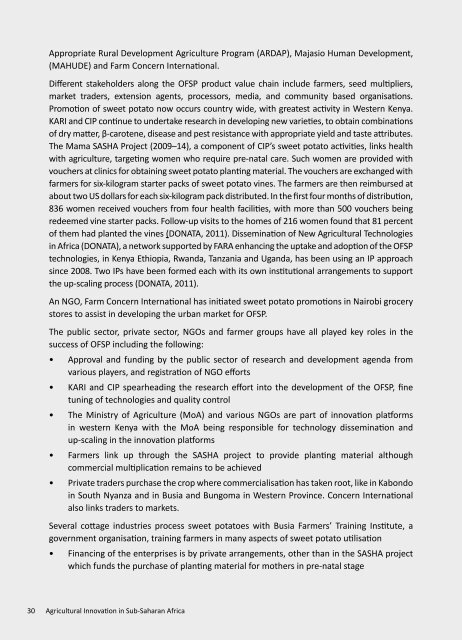1C1KKTs
1C1KKTs
1C1KKTs
You also want an ePaper? Increase the reach of your titles
YUMPU automatically turns print PDFs into web optimized ePapers that Google loves.
Appropriate Rural Development Agriculture Program (ARDAP), Majasio Human Development,<br />
(MAHUDE) and Farm Concern International.<br />
Different stakeholders along the OFSP product value chain include farmers, seed multipliers,<br />
market traders, extension agents, processors, media, and community based organisations.<br />
Promotion of sweet potato now occurs country wide, with greatest activity in Western Kenya.<br />
KARI and CIP continue to undertake research in developing new varieties, to obtain combinations<br />
of dry matter, β-carotene, disease and pest resistance with appropriate yield and taste attributes.<br />
The Mama SASHA Project (2009–14), a component of CIP’s sweet potato activities, links health<br />
with agriculture, targeting women who require pre-natal care. Such women are provided with<br />
vouchers at clinics for obtaining sweet potato planting material. The vouchers are exchanged with<br />
farmers for six-kilogram starter packs of sweet potato vines. The farmers are then reimbursed at<br />
about two US dollars for each six-kilogram pack distributed. In the first four months of distribution,<br />
836 women received vouchers from four health facilities, with more than 500 vouchers being<br />
redeemed vine starter packs. Follow-up visits to the homes of 216 women found that 81 percent<br />
of them had planted the vines (DONATA, 2011). Dissemination of New Agricultural Technologies<br />
in Africa (DONATA), a network supported by FARA enhancing the uptake and adoption of the OFSP<br />
technologies, in Kenya Ethiopia, Rwanda, Tanzania and Uganda, has been using an IP approach<br />
since 2008. Two IPs have been formed each with its own institutional arrangements to support<br />
the up-scaling process (DONATA, 2011).<br />
An NGO, Farm Concern International has initiated sweet potato promotions in Nairobi grocery<br />
stores to assist in developing the urban market for OFSP.<br />
The public sector, private sector, NGOs and farmer groups have all played key roles in the<br />
success of OFSP including the following:<br />
• Approval and funding by the public sector of research and development agenda from<br />
various players, and registration of NGO efforts<br />
• KARI and CIP spearheading the research effort into the development of the OFSP, fine<br />
tuning of technologies and quality control<br />
• The Ministry of Agriculture (MoA) and various NGOs are part of innovation platforms<br />
in western Kenya with the MoA being responsible for technology dissemination and<br />
up-scaling in the innovation platforms<br />
• Farmers link up through the SASHA project to provide planting material although<br />
commercial multiplication remains to be achieved<br />
• Private traders purchase the crop where commercialisation has taken root, like in Kabondo<br />
in South Nyanza and in Busia and Bungoma in Western Province. Concern International<br />
also links traders to markets.<br />
Several cottage industries process sweet potatoes with Busia Farmers’ Training Institute, a<br />
government organisation, training farmers in many aspects of sweet potato utilisation<br />
• Financing of the enterprises is by private arrangements, other than in the SASHA project<br />
which funds the purchase of planting material for mothers in pre-natal stage<br />
30 Agricultural Innovation in Sub-Saharan Africa


